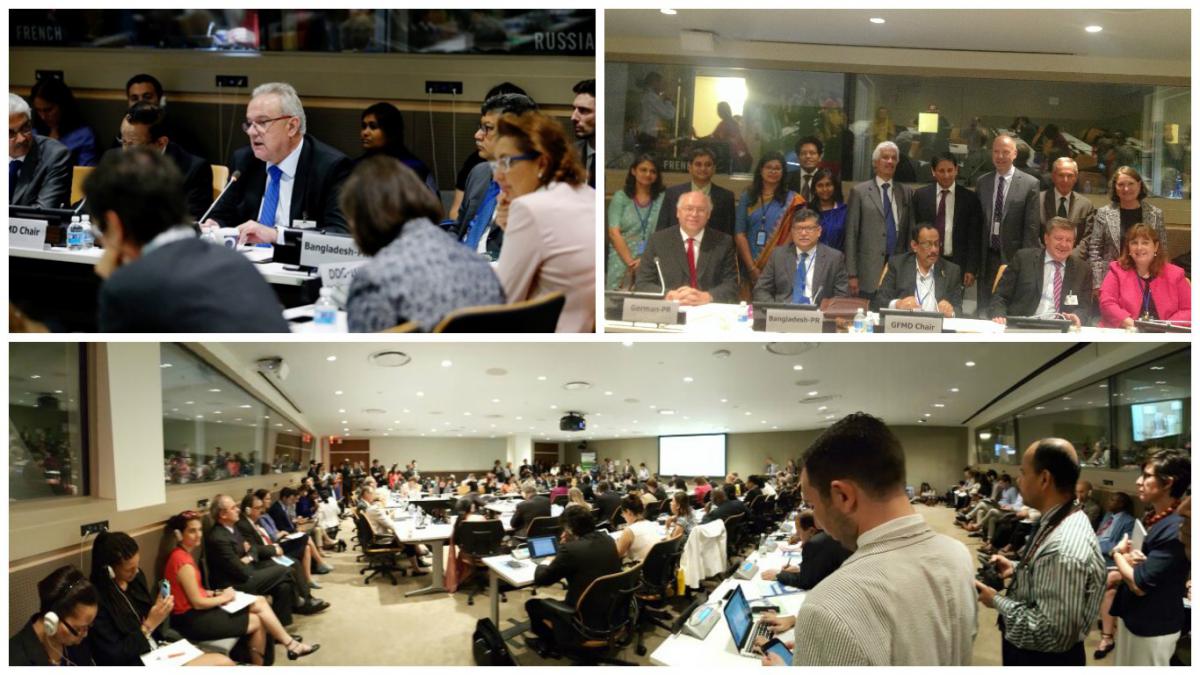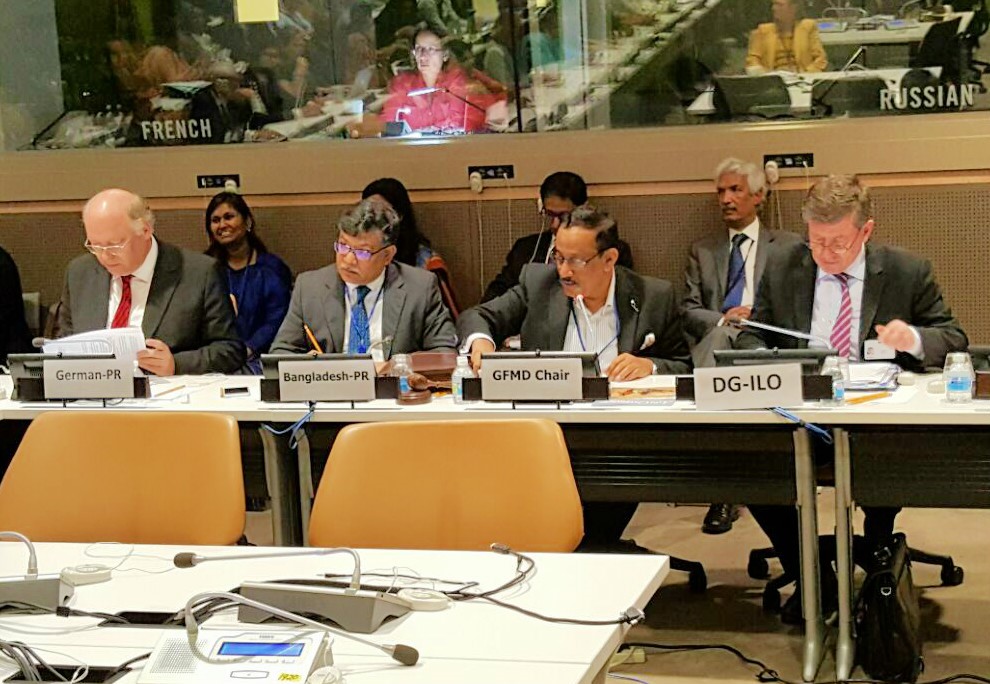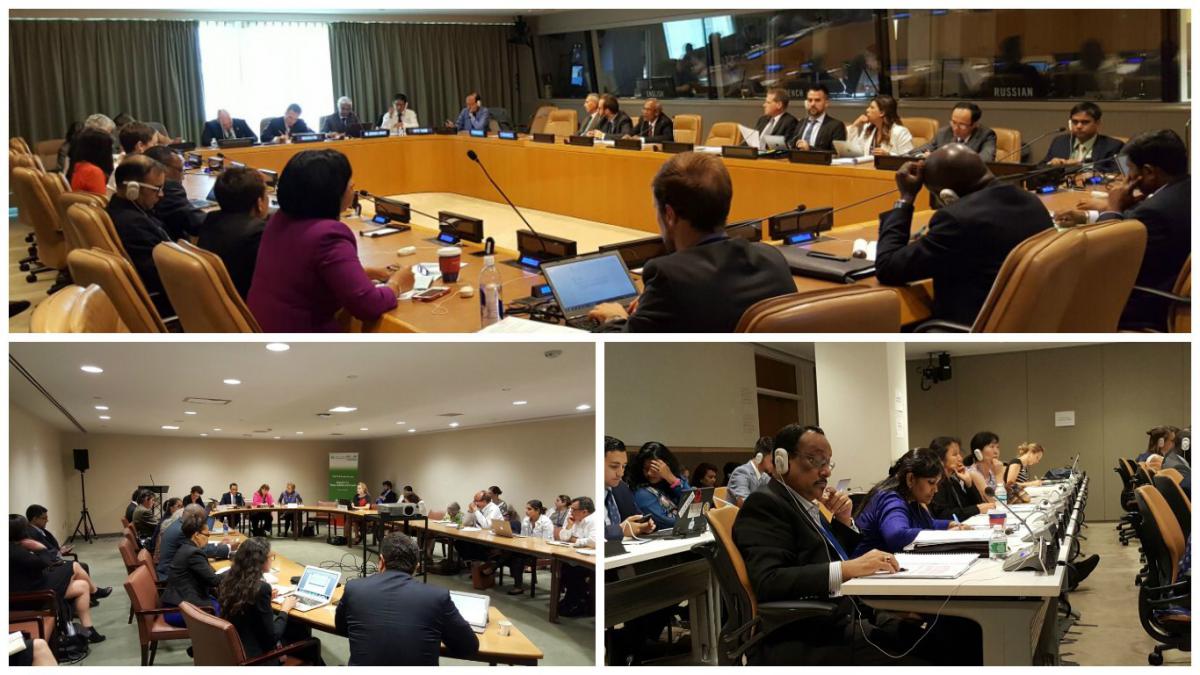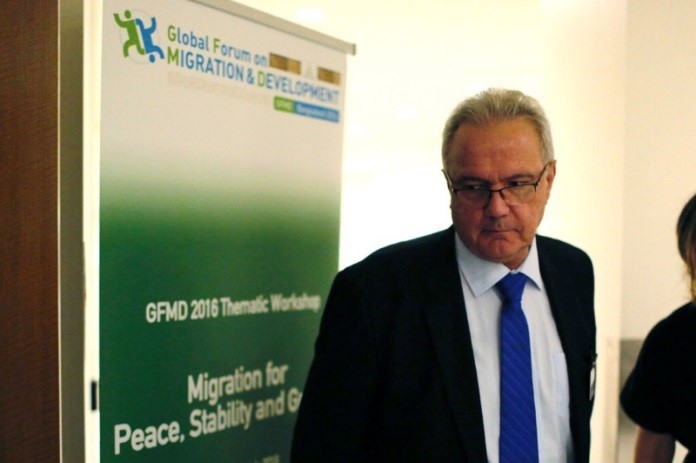Migration for Peace, Stability and Growth

On the road to international migration governance
In accordance with the work plan of the 2016 Chair-in-Office of the Global Forum on Migration and Development (GFMD), the third and final thematic workshop on “Migration for Peace, Stability and Growth” was held at the United Nations Headquarters in New York on July 19, at the margins of the fourth High Level Political Forum on Sustainable Development (HLPF).
In the heatwave so particular for the Big Apple in this season, over a hundred delegates filled the meeting room in order to explore the mutually reinforcing links between migration and peace, stability, growth, and security. An important appeal was made for a comprehensive and coherent policy at all levels and improved governance of international migration. There was a resounding call to create a new narrative that emphasizes the positive aspects of migrants and migration. Member states and non-government participants also recognized the need for a collective and shared responsibility, noting the failure of unilateral actions in many parts of the world. Finally, the workshop fostered a fruitful exchange of policy views and experiences between participants and reaffirmed the crucial role of the GFMD as an effective mechanism for informal debate and international dialogue and, more importantly, its potential to play an important role in redefining the governance of international migration.

2016, A Year of Opportunities
The year 2016 is marked by both high stakes --- on one hand, simultaneous and complex crises brought about by large movements of refugees and migrants and, on the other hand, opportunities presented by the first phase of the implementation of the 2030 Agenda for sustainable development that now includes migration-related goals and targets. In this context, there was a common understanding of both the need to provide legal means and safer routes for migrants and to address the issues not only through the prism of the current migration crisis but also the long-term trends of international migration. Better management of migration will require a holistic approach that engages all actors in a spirit of shared responsibility and examines the different push and pull factors of migration. Participants recognized that it was the right moment to move on to the next phase of international migration governance.
Towards a new narrative
How to shift the migration discourse from its focus on security concerns and threats to the reality that migration is a driver of peace, stability and growth? During the workshop, several speakers shared their views on this issue. In his remarks, UN Deputy Secretary General Eliasson called for a more coherent approach within states and a new narrative that focuses on the contributions of migration to economic prosperity and sustainable development. Ms. Kathleen Newland of the Migration Policy Institute pointed out the powerful transformative impact and disrupting effect of international migration – i.e., while it brings overall positive changes and benefits, some people might feel disadvantaged and will falsely consider migration as the source of their difficulties. In order to avoid populist reaction, misperception and negative response, we should also take into consideration their concerns, instead of ignoring them. As a striking example, Mr. Matthew Hodes, Director of the UN Alliance of Civilization, cited the #SpreadNoHate initiative which is inviting the media, policy makers and the general public to counter hate speech and rhetorical excesses towards migrant communities and to develop a more complete and accurate coverage on the issue. Mr. Guy Ryder, ILO Director General, stated that guaranteeing access to labour market for migrants, ensuring equal treatment and combating informality are the most appropriate means to diffuse the toxic discussion. Ambassador Laura Thompson, IOM Deputy Director General, meanwhile, highlighted the enormous contributions international mobility brings by filling in labour gaps and introducing innovative approaches in their host societies, while ensuring the steady flows of remittances and sharing of new knowledge, skills and networks in origin countries. As these angles are too often overlooked, misguided discomfort, threats and fears are created in the public sphere. It is now time to change that.
Towards a more coherent and responsive governance framework
How can migration and development help foster stability, peace and growth? As Ambassador Shahidul Haque, GFMD 2016 Chair, cleverly pointed out, there is an actual mismatch between the existing mechanisms and this contemporary challenge. For his part, Mr. Peter Sutherland, UN Secretary General’s Special Representative for International Migration, strongly advocated for a process that can establish an institutional governance framework and operationalize obligations among states and other actors. The big question is how to do so? To this end, all participants welcomed the integration of the IOM within the UN system as a first step to engage better coordination and integration in migration affairs. Ms. AbuZayd and Mr. Thomas Gass pointed out the importance of the upcoming High Level Summit on Addressing Large Movement of Refugees and Migrants, which could be another crucial milestone for the achievement of the SDG 10.7 on safe, regular and orderly migration. EU Commissioner Neven Mimica sounded a call for collective action and a global response involving all stakeholders in order to reach the ultimate goal of making migration a choice rather than a necessity. After reminding the participants of the huge progress made by the GFMD since its creation, Ambassador Eva Åkerman Börje from Sweden stressed that the Global Forum can play an active role in the next steps, by collectively preparing the discussion and developing ideas for a Global Compact.

A. Implementing the 2030 Agenda Commitments
Now that the Agenda 2030 has set up globally accepted targets on migration, how can countries implement the commitments they agreed upon and how can these be monitored? The first break-out session addressed this critical question. As reported by moderator Switzerland, migration needs to be anchored in national implementation strategies and, in line with Goal 17, has to integrate external factors, forces and partners. Reaching the targets would require updated, coherent and integrated policies, the implementation of international instruments at local level and investment in resources, particularly abroad.
B. Addressing the challenges of migration
The second break-out session moderated by Mexico considered the elements of governance of international migration. Participating countries and speakers agreed on the necessity of cooperation when dealing with specific clusters of challenges, whether they be at bilateral, sub-regional or regional levels. Some delegates spoke strongly about embarking on the next stage of global governance, thus, raising the question of how to build a common set of principles. Among the crucial elements cited were understanding the factors that encourage people to migrate, strengthening national capacities and migration policies, sharing of global responsibility along with sharing prosperity, and capacity-building role of the United Nations. Finally, moving from words to action and towards global governance will require a common roadmap that considers the needs and capacities of all countries, including small island states and the Mediterranean.
C. Mini-multilateralism, a response to displacement and crisis migration?
In the third and last group, participants explored the factors and drivers of crisis-induced migration and displacement. The US reported on behalf of co-moderator Philippines that there was agreement in the group on the multiple layers – including conflict, climate change or extreme poverty -- and current gaps in policy responses. Mini-multilateralism, with models such as the Nansen and MICIC Initiatives, was cited as an effective approach when states, joined by relevant stakeholders, are willing to act rather than wait for cumbersome bureaucratic processes. This session reiterated that there was no need to reinvent the wheel. Indeed, even though there lacks a comprehensive framework in this area, there already exists a body of laws, practices and policies that could be compiled, consolidated and used by all stakeholders.


![]() The current unprecedented refugee and migration situation is a global challenge, which needs a global response. All countries and stakeholders must join forces in ensuring we can live up to our commitments as expressed in the 2030 Agenda - to leave no-one behind
The current unprecedented refugee and migration situation is a global challenge, which needs a global response. All countries and stakeholders must join forces in ensuring we can live up to our commitments as expressed in the 2030 Agenda - to leave no-one behind![]()
- Neven Mimica
European Union
![]() Let us make the most of this opportunity to reflect on the contributions of migration to peace, stability and growth. Let us recall then that historically migration has contributed enormously to social and econonomic development. The challenge, for the international community is to maximize these benefits through sound governance.
Let us make the most of this opportunity to reflect on the contributions of migration to peace, stability and growth. Let us recall then that historically migration has contributed enormously to social and econonomic development. The challenge, for the international community is to maximize these benefits through sound governance.![]()
- Laura Thompson
International Organization for Migration
![]() I think you have framed the debate very helpfully. And it has got enormous resonance from my organization, the International Labour Organization; with the basic proposition that was made a hundred years ago, that if you don't ensure social justice for all, then you place peace and you place stability under threat.
I think you have framed the debate very helpfully. And it has got enormous resonance from my organization, the International Labour Organization; with the basic proposition that was made a hundred years ago, that if you don't ensure social justice for all, then you place peace and you place stability under threat.![]()
- Guy Ryder
International Labour Organization
![]() We are trying to address a contemporary and extremely volatile problem with some tools and instruments which were established in the wake of 2nd World War. There is a huge mismatch between those instruments and the current challenges. If we want to make migration really work for peace, stability and growth, we need a different kind of architecture.
We are trying to address a contemporary and extremely volatile problem with some tools and instruments which were established in the wake of 2nd World War. There is a huge mismatch between those instruments and the current challenges. If we want to make migration really work for peace, stability and growth, we need a different kind of architecture.![]()
- Amb. Md. Shahidul Haque
GFMD 2016 Chair
View the full report of the Third Thematic Workshop on Migration for Peace, Stability and Growth
For the previous meeting, view the summary report of the Second Thematic Workshop on Migration for Harmonious Societies and the report of the First Thematic Workshop on Migration - Connectivity - Business
